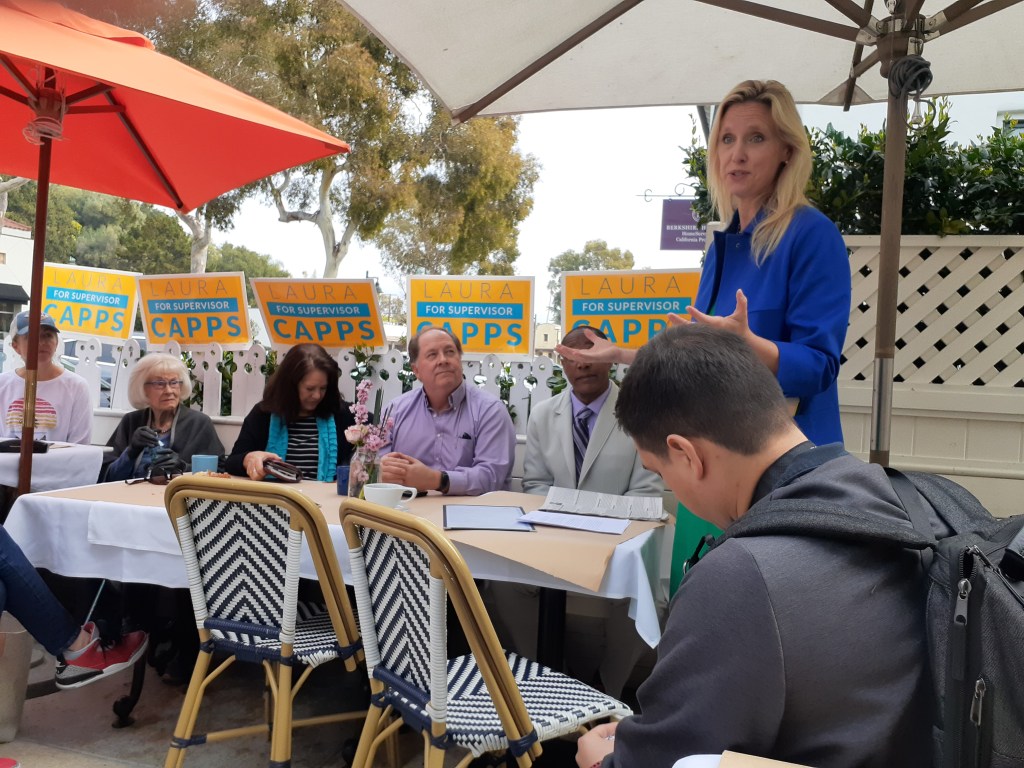First District supervisor candidate Laura Capps called for a comprehensive countywide climate safety plan Tuesday, holding a roundtable breakfast with Montecito residents, environmentalists, and others directly impacted by the Thomas Fire and subsequent debris flow.
“We need the county to be not just a partner but an active, forward-thinking partner,” Capps said to the group of 15 or so about addressing climate change and resiliency in the district.
The group met on the patio of Jeannine’s in Montecito, which served as a critical center after the 1/9 Debris Flow when it gave out free food and information on the latest recovery information during the disaster. Jeannine’s hosted Capps’s roundtable.
“The public safety power shutoffs have really brought a higher level of awareness to the community,” said Judi Weisbart, Vice President of Community Relations for the World Business Academy and a major push behind the Montecito Community Microgrid Initiative. “The microgrid for the Montecito Fire Department is actually already out for bid, and the Montecito Union School is looking at bids and designs. We are getting there, but we need more.”
Much of the conversation focused on microgrids — number one of Capps’s five-part climate plan. President of the Santa Barbara Board of Education, Capps was a major influence in the board’s vote to initiate the first phase of district-wide microgrids last December. Microgrids are like a smaller version of the electric grid, but they can run independently even if the main electric power grid is shut off during a disaster or public safety power shutoff.
The rest of Capps’s plan involves putting clean water security at the forefront, pushing taxpayer-funded institutions to lead the charge on solar and electric cars, exploring mass transit along the 101 and continuing to create incentives for electric vehicles and electric bicycles, as well as using public schools as safe havens during disasters.
Although not explicitly part of her plan, many around the table brought up the disaster’s effect on home insurance costs.
“Climate change is completely uncharted territory for insurers,” said Darcie McKnight, a Montecito Realtor. “They aren’t writing policies for any home in the area.” About five others chimed in with McKnight about insurance companies refusing to cover them after the recent disasters, prompting Capps to suggest a new addition to her plan.
“It sounds like we need to pull all the expertise together, not just in Montecito but throughout the county, and come up with a plan for insurance,” Capps said.
Ultimately, the main theme of the event was centered on Capps’s willingness to bring together like-minded people to find a common solution. Entrepreneur and philanthropist Sara Miller McCune commended Capps for the event because she was promoting “proactive government” rather than “reactive government.”
“We have to pay attention to the difference between proactive government and reactive government when it comes to climate change,” McCune said. “One of the things that made me furious following the debris flow … more than a year later, the basins were three-quarters full of debris before they were cleaned. That is crazy.”
To read about Capps’s full climate plan, click here.

